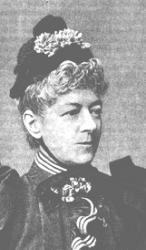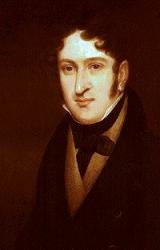1814 - 1898 Hymnal Number: 101 Author of "Work, for the Night is Coming" in The King of Glory Dyer, Sidney, who served in the U. S. Army from 1831 to c. 1840, is a native of White Creek, Washington County, New York, where he was born in 1814. On leaving the army he was ordained a Baptist Minister in 1842, and acted first as a Missionary to the Choctaws, then as Pastor in Indianapolis, Indiana (1852), and as Secretary to the Baptist Publication Society, Phila. (1859). He has published sundry works, and in the Southwestern Psalmist, 1851, 16 of his hymns are found.
The following are later and undated:—
1. Go, preach the blest salvation. Missions. In the Baptist Praise Book, 1871, and The Baptist Hymn & Tune Book, 1871.
2. Great Framer [Maker] of unnumbered worlds. National Humiliation. In the Boston Unitarian Hymn [and Tune] Book, 1868, and others.
3. When faint and weary toiling. Work whilst it is day. In the Baptist Praise Book, 1871.
4. Work, for the night is coming. Duty. This hymn is in wider use than the foregoing, but though often ascribed to Dyer, is really by Miss Anna L. Walker, of Canada, who published a volume of Poems, 1868. S. Dyer, in 1854, wrote a hymn on the same subject for a Sunday-school in Indianapolis, and hence the confusion between the two. In 1882 a cento beginning with the same stanza was given in Whiting's (English) Hymns for the Church Catholic, No. 366. Of this cento, stanzas i., ii. are by Miss Walker; and stanzas iii., iv. by Miss Whiting, daughter of the editor of that collection. [Rev.F. M. Bird, M.A.]
-- John Julian, Dictionary of Hymnology (1907)
==================
Dyer, S., p. 317, ii. Additional hymns by Dr. Dyer are given in the Baptist Sursum Corda, Phila., 1898, with the following dates :—
1. Enter, Jesus bids thee welcome. Invitation. 1883.
2. No more with horrors veil the tomb. Burial. 1897.
Dr. Dyer d. in 1898.
--John Julian, Dictionary of Hymnology, New Supplement (1907)
=================
Dyer, Sidney. (White Creek, New York, February 11, 1814--December 22, 1898, Philadelphia). Baptist. Indiana State University, honorary A.M. ; Bucknell University, honorary Ph.D. Missionary to the Choctaws early in his career. Pastorates at Brownsville, New York, 1842; Indianapolis, 1852-1859. District secretary of the American Baptist Publication Society, Philadelphia, 1859-1885. Author of eight religious books designed for children, two volumes of verse: Voices of Nature (Louisville, 1849), and Songs and Ballads (Indianapolis, 1857). Wrote a large number of hymns in Sunday School as well as church collections. In 1851, he published The South Western Psalmist (Louisville), which became known as Dyer's Psalmist. Of 467 hymns, 16 are by Dyer. Also wrote a prize-winning hymn "O wondrous land! thy onward march sublime" for the Jubilee of the American Baptist Home Mission Society which was help in New York in 1882. This 66-stanza hymn may be found in Baptist Home Missions in North America: Including a Full Report of the Proceedings and Address of the Jubilee Meeting . . . (New York: Baptist Home Mission Rooms, 1883). "Work, for the night is coming," written by Annie L. (Walker) Coghill, was sometimes ascribed to Dyer. The confusion arose when, in 1854, Dyer wrote a text on the same subject for a Sunday School in Indianapolis.
--Deborah Carlton Loftis, DNAH Archives
Sidney Dyer


 My Starred Hymns
My Starred Hymns






